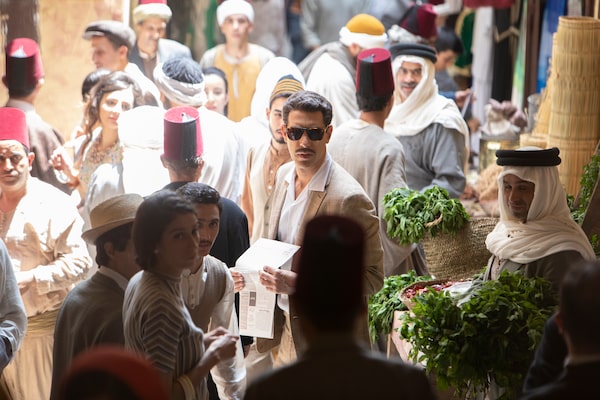
What Eli Cohen did and what he endured beggars belief, but it’s all very close to the truth.Axel Decis/Netflix
Sometimes the sheer twisted intensity of a true story carries a series very far.
That’s the case with The Spy (streaming on Netflix), a six-parter that’s based on the story of real-life Mossad agent Eli Cohen, who went undercover for Israel in Syria in the early 1960s, with spectacular success for a while.
What he did and what he endured beggars belief, but it’s all very close to the truth. That gives some heft and shock-value to what is sometimes a rather laboured drama. Another major attraction is Sacha Baron Cohen being utterly compelling in a rare straight-man role as the title character.
After a brief but chilling opening scene that depicts the end of Cohen’s role as a spy in Syria, we meet Eli when he’s simply an Egyptian Jew living in Israel, happily married (Hadar Ratzon Rotem, who was in the original Israeli version of Homeland, is magical as Eli’s wife Nadia) but alert for social slights against him. “When they look at me they see an Arab, just an Arab,” he says to his wife after he’s mistaken for a waiter at a party.

Sacha Baron Cohen is utterly compelling in a rare straight-man role as the title character.David Lukacs/Netflix
He is in fact already a hero, having smuggled Jews out of Egypt to Israel, but hardly anyone knows about that. He’s applied to work for Mossad twice but has been turned down. Then, at a pivotal point in Israel’s pugnacious relations with Syria, his file lands on the desk of Dan Peleg (Noah Emmerich, who was Stan Beeman on The Americans). With some reluctance, Peleg agrees to train Eli as a spy in a few short months, and put him into Syria, undercover.
It’s at this point The Spy looks a bit light on energy and long on conventional depiction of espionage training. Emmerich is excellent as Peleg but he’s an actor who can handle subtlety with ease and things get a tad unsubtle here. Watching him, you might long for more nuance.
Still, it is after this section that Baron Cohen does absolutely revelatory work. He’s in almost every scene and he commands the plot with grace and power. Any thoughts you have of his Ali G and Borat roles evaporate. What he’s doing here is immensely clever and deliberate – in shifting from Eli the normal nice guy and loving husband, into Kamel Amin Thaabeth, the Syrian-born businessman, he’s doing what actors do. He’s not leaving his true self behind but learning to keep it hidden with a kind of ferocity that is gripping and convincing, but takes an incredible toll on the true self.
Feel free to speculate on what Baron Cohen is up to, because he’s also an executive producer. By all means extrapolate he’s commenting on what he does as an entertainer, embodying those baroque characters he plays. The gist is this: The actor must hold everything together, always, and that’s what Baron Cohen does, holding the whole six-part drama together, doing justice to the true story of a man faking it and giving us a master class in acting.
As Kamel, Eli establishes himself in Buenos Aires, where a large expat Syrian population lives and does business. And he meets top officials from Syria who are looking to buy arms. The ease of his entry into the top Syrian military and government circles is astounding, and that’s where you need to remember that it’s a true story. Then you need to remind yourself that what this lead actor is doing is telling us about the dangerous skills a great actor needs.

The Spy was created, partly written and fully directed by Gideon Raff, who created the Israeli series Prisoners of War, which became the basis for Homeland.Axel Decis/Netflix
While there is a remarkable ease to the spy’s move upward into the establishment after he gets to Syria, it’s not all easy. There are some who are suspicious of him and Alexander Siddig is excellent as a security guy who oozes a simmering menace every time he gazes at this charming Kamel guy. You know he’s got a nose for detecting acting and he just needs some proof to expose the thespian hiding inside the suave businessman. There is a heavy-handed quality at times to Kamel’s fraught circumstance and a sequence in which he encounters one real estate developer named Mohamed Bin Laden could have been left out. But one understands fully the emotional pull of the sequence.
The Spy was created, partly written and fully directed by Gideon Raff, who created the Israeli series Prisoners of War, which became the basis for Homeland. This series lacks the propulsive quality of the original and the remake and leans more toward the conventional and occasionally lumbering drama. Yet it has great power and an aura about it, based on its emotional mooring in truth. And then there’s the feeling of awe as you watch Baron Cohen take a deep, deep dive into the treacherous process of acting, both in real life and as an act of espionage.